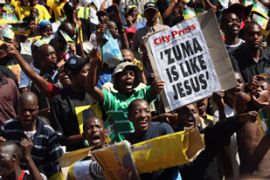ANC nears S Africa election win
But ruling party still not guaranteed two-thirds majority to control parliament.

But the Congress of the People (Cope) party – formed by ANC dissidents with the aim of posing the first real challenge since the end of apartheid in 1994 – won 7.66 per cent of votes counted.
The ANC’s closest rival was the Democratic Alliance (DA), a predominantly white opposition party, with 16.37 per cent.
DA advances
The DA pulled ahead of the ANC in the Western Cape province – South Africa’s main tourist destination, which is currently controlled by the ANC.
The final result is expected late on Friday.
| South African election 2009 |
|
|
Helen Zille, the leader of the DA, said: “I feel very good about the national results … We are just above 50 per cent in the Western Cape. That is what we were hoping for … it means we have doubled our numbers since last time.”
Speaking to Al Jazeera, she said: “Cabinet has just passed and approved legislation to change the constitution if the ANC gets two-thirds.
“They have approved the bill that will change the constitution to reduce the powers of local governments very severely.”
Changing the constitution is largely symbolic, and the ANC has never changed it since it came power in 1994.
Ebrahim Fakir, an analyst from the Electoral Institute of Southern Africa, said.”The debate was always been whether the ANC was going to get two-thirds or fall below the two-thirds threshold. They were always going to win.
“At this stage the race for second and third, which is what really I think everyone was really watching over the past two days, is far from settled.”
Record turnout
A record 80 per cent of South Africans turned out at nearly 20,000 polling stations on Tuesday, causing ballot shortages and overflowing boxes.
The long lines of voters recalled images of South Africa’s first democratic elections in 1994, when Nelson Mandela became president following the end of apartheid.
| In video | ||
|
| ||
 Economic woes imperil South Africa’s Aids fight Economic woes imperil South Africa’s Aids fight Inequality persists in South African schools Inequality persists in South African schools Kimberley miners hit by economic slowdown Kimberley miners hit by economic slowdown South Africans face lack of basic services South Africans face lack of basic services  Security a key issue in South African elections Security a key issue in South African elections |
Despite the public enthusiasm for the polls, The Star newspaper cautioned that South Africa faced immense challenges made more difficult in the global economic crisis.
“Millions of our citizens remain mired in poverty, our health services are inequitable and our education system is a national tragedy,” it said.
“We have heard the campaign talk – now we want a new patriotism and action.”
The poll was conducted largely peacefully, but a Cope party official in the Eastern Cape was shot dead by three armed men in an attack on his home.
Zuma has campaigned on a pro-poor ticket with promises of improved public services, but will enter office as South Africa slides toward recession.
Despite the gains since apartheid, public frustrations are growing with unemployment estimated at 40 per cent.
Crime is soaring and South Africa has the world’s largest caseload of people with HIV/Aids.
